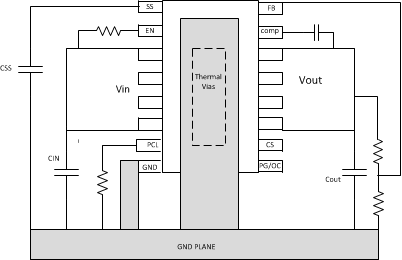SLVSAS4J June 2013 – April 2017 TPS7H1201-HT
PRODUCTION DATA.
- 1 Features
- 2 Applications
- 3 Description
- 4 Revision History
- 5 Pin Configuration and Functions
- 6 Specifications
- 7 Detailed Description
- 8 Application and Implementation
- 9 Power Supply Recommendations
- 10Layout
- 11Device and Documentation Support
- 12Mechanical, Packaging, and Orderable Information
Package Options
Mechanical Data (Package|Pins)
- HKS|16
- KGD|0
Thermal pad, mechanical data (Package|Pins)
Orderable Information
10 Layout
10.1 Layout Guidelines
- For best performance, all traces should be as short as possible, and no longer than 5 cm.
- Use wide traces for IN, Out and GND to minimize the parasitic electrical effects.
- Place the output capacitors (COUT) as close as possible to the OUT pin of the device.
10.2 Layout Example
 Figure 30. PCB Layout Example
Figure 30. PCB Layout Example